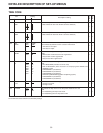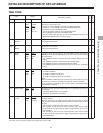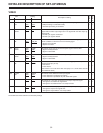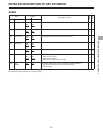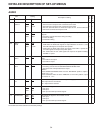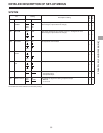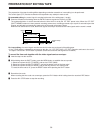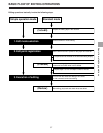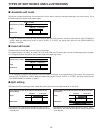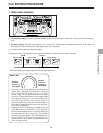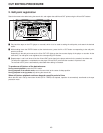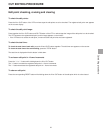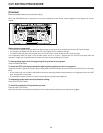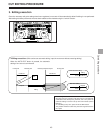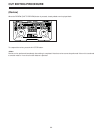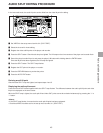
TYPES OF EDIT MODES AND ILLUSTRATIONS
38
■ Assemble edit mode
Signals are recorded continuously and successively from the start of usually a new tape (used tapes can also be used). This is
the mode commonly used to make master tapes.
• In order to maintain the continuity of the time codes on the tape in the recorder, set set-up menu item No. 507 (TC MODE) to
“I-REG”. When the setup menu No.507 is set to “P-REC” or “P-FREE”, set set-up menu item No. 510 (REGEN MODE) to
“AS&IN” or “ASSEM.”
■ Insert edit mode
A different source is recorded on part of a pre-recorded tape.
Four types of signals—V (video), A1 (audio CH1), A2 (audio CH2) and TC (time code)—can be recorded separately or altogeth-
er. The signals must be recorded on the recorder’s tape from beginning to end.
• If it is necessary to maintain the continuity of the time codes on the tape in the recorder during TC insertion, set set-up menu
item No. 507 (TC MODE) to “I-REG”. When the setup menu No.507 is set to “P-REC” or “P-FREE”, set set-up menu item No.
510 (REGEN MODE) to “AS&IN” or “INSRT.”
■ Split editing
Split editing involves a technique which offsets the audio edit point from the video edit point or vice versa.
Recorder prior to editing
Already recorded
P IN point
P OUT point
R IN point
R OUT point
Not recorded
Player
Edited result
Recorder prior to editing
Already recorded
P IN point
P OUT point
R IN point
R OUT point
Player
Edited result
P IN point
AUDIO IN point
P OUT point
R IN point
R OUT point
Player
Edited result
Video
Audio
(CH1/CH2)
When offsetting the audio IN point with the video IN point serving
as the reference
P IN point
VIDEO IN point
P OUT point
R IN point
R OUT point
Player
Edited result
Video
Audio
When offsetting the video IN point with the audio IN point serving as
the reference
• Set VIDEO for the set-up menu item No.311 (SPLIT EDIT).
• Alternatively, the audio IN point can be moved ahead of the
video IN point.
• Set AUDIO for the set-up menu item No.311 (SPLIT EDIT).
• Alternatively, the video IN point can be moved ahead of the
audio IN point.



